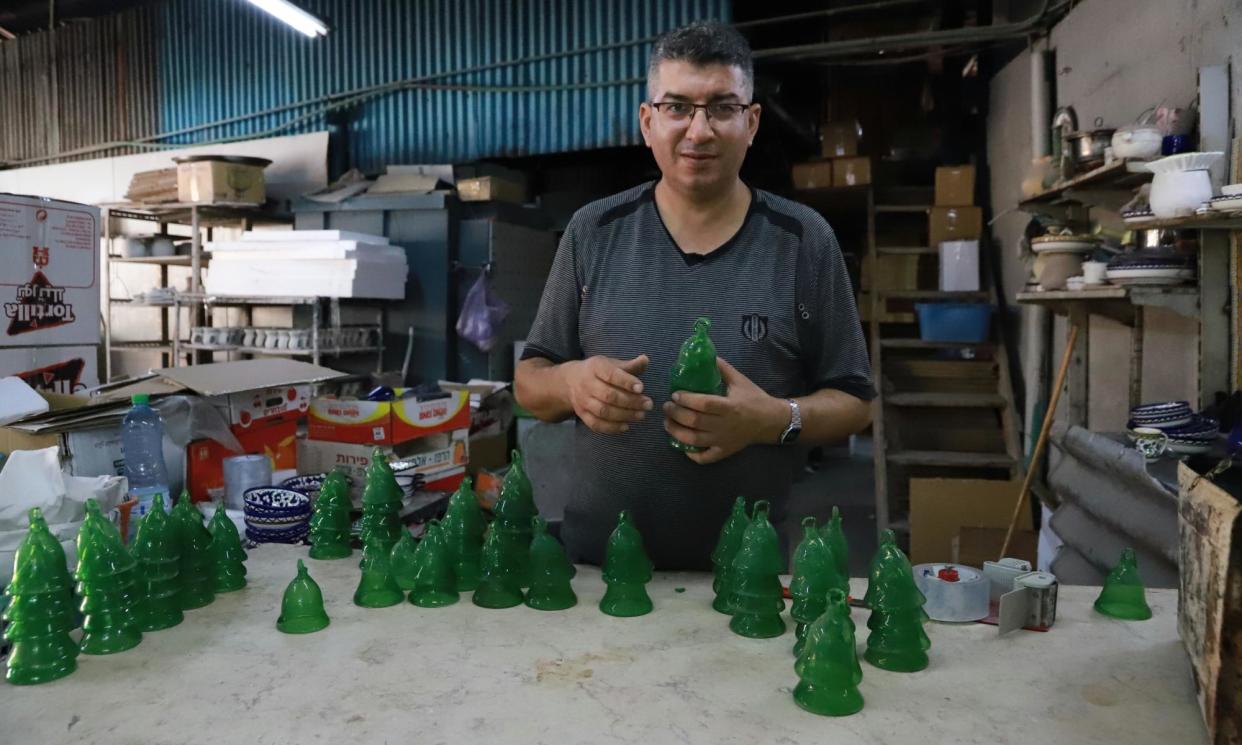‘No one has any money’: Israel’s restrictions stifle West Bank economy

At al-Salam glass and ceramics factory on the outskirts of Hebron, the glassblowing furnace and the potter’s wheel are no longer in daily use; the room where artists decorate bowls and tiles with the traditional blues, yellows and reds of the Palestinian craft is sometimes empty.
The glass panes of one window and a door now bear the unmistakable spiderweb-like holes created by gunfire. Israeli soldiers at a nearby checkpoint fired live bullets at teenagers and young men throwing stones in an altercation a few weeks ago, said the factory’s owner, Sami al-Nader.
Hebron, a city in the south of the occupied West Bank, is far from the fighting between Hamas and Israel that has raged in the Gaza Strip for 10 months. But violence between Palestinians and the Israeli army and settlers in the West Bank has also reached a level not seen for 20 years, and new restrictions such as road closures, lockdowns and the cancellation of thousands of Israel work permits are suffocating the economy and daily life.
“The pandemic does not compare to what our business is going through now. We used to welcome tourists every day, and now, if we are lucky, we sell things on Saturdays only. We are not even getting online orders, because no one in Palestine has any money,” said Nader, 47.
“My family has owned the factory for more than 70 years. I do not want it to close under my watch.”
For better or worse, the Israeli and Palestinian economies are deeply intertwined: Israel relies on cheaper Palestinian labour, particularly in construction and agriculture, and before the war higher Israeli wages generated an estimated 20% of the Palestinian Authority’s (PA) GDP. In 2022, these workers contributed £3.05bn to the Palestinian economy, two-thirds of the PA’s total budget.
After the Hamas attacks of 7 October, however, Israel suspended entry for about 140,000 Palestinian workers from the West Bank. Only a fraction of those have since been restored, and Israel is trying to plug the gap with labourers from India.
As a result, unemployment and poverty in the West Bank have soared, putting the already unstable territory on the brink of a financial crash and fuelling unrest. In the West Bank’s refugee camps, set up after the creation of Israel in 1948 and even today still slum-like, young men told the Guardian that militant groups such as Hamas and Palestinian Islamic Jihad were the only employers they could find.
Unemployment in the first quarter of 2024 was up 11% to 35% year on year, according to the International Labour Organization, and the UN estimates a 13- to 16-year setback in human development.
Inflation is up, the PA has slashed salaries and cut workers, and Israel’s far-right finance minister, Bezalel Smotrich, is withholding tax funds to the PA as a punitive measure for its cooperation with the international criminal court in The Hague. He has also repeatedly threatened to cut off Palestinian banks from the international banking system, which would cause the PA to collapse altogether.
“All Israeli administrations use the stick and the carrot with the PA, but the current government is pursuing particularly contradictory policies. Israel needs the PA to maintain security in the West Bank and protect settlers but they are leveraging what they can,” said Tahani Mustafa, a senior Palestine analyst at the Crisis Group thinktank.
“The other logic is that of collective punishment: although it’s not worked in the past they seem to still believe that if you impose an economic siege, and a siege on movement, and squeeze the people enough, they will obey.”
In Nahalin, a Palestinian village south of Jerusalem, father and son Mahmood and Yaqoub Dadouh, both skilled marble and stone workers, now spend most of their days doing projects in the garden. The lights are off in Mahmood’s huge kitchen and bathroom materials warehouse next door; he used to mainly supply Israelis from the nearby settlement of Beitar Illit, but not a single customer has come for the better part of a year.
Yaqoub, a father of two small girls, said he was still owed 16,000 shekels (£3,300) from a project in Israel that was cancelled after 7 October. The contractor is refusing to take his calls.
“We’ve already sold all of the gold, the jewellery. It was heartbreaking asking my wife to do that,” said Yaqoub, 29. “I think we can manage with our savings for another two months. After that I have no idea what we are going to do.”
There is no reliable data, but in the past few years people in the West Bank have begun finding ways to get through Israel’s various security barriers into Israel without permits, in search of better-paid work. It is a dangerous decision, but an estimated 40,000 Palestinians are still making the journey, sometimes staying in Israel undocumented for weeks at a time.
A cousin of the Dadouhs found work on a construction site in southern Israel a few weeks ago, the pair said. He has no insurance or rights and risks being caught, but is at least able to send money to his family.
“I think the situation is not sustainable,” Yacoub said. “They don’t want us any more – then end the occupation and let us work for ourselves.”


